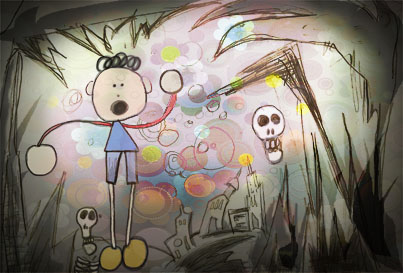In The Perennial Philosophy Aldous Huxley describes contemporary institutions as “organized lovelessness.” What a poignant phrase, and it’s a much better definition of being corporate than anything I could articulate even with hundreds of words. (In fact, maybe you would be better off reading his book instead of this post. If that’s what you’re thinking and if you have the time to read more than 200 pages of metaphysical commentary, then you can find the book here, provided online by Google Books.)
When I protest against being corporate, I’m not talking about the ever-growing complexity of specialization or organization that have developed to accommodate our modern society. After all, highly specialized, organized people have made it possible for me to write this blog post at no cost, within the comfort of my home, on a computer I can take anywhere. What’s not to like about that? No when I’m making a case for being less corporate, I’m talking about the organized lovelessness that can show its ugly head in our business, political, and religious interactions if we’re not vigilant.
How awful it is to be treated like a thing and not like a beloved person. But, that’s what happens when a mission statement becomes more important than the people whom the mission statement is supposed to serve. It’s why company policies meant to help serve customers can become bureaucratic nightmares and why a noble political system dedicated to preserving individual freedom can devolve into pressured conformity.
Even churches or other religious institutions are not immune from this plague of organized lovelessness. This is indeed a disheartening thing, since places of worship, at their best, are built on the belief that God loves his creatures enough to care about their development. From this foundation, dignity for human life and decency within a civilization can develop. And yet, perhaps you’ve been to a loveless, dogmatic-driven church that left you feeling so cold and unconnected to others that you were driven faster into the seductive (but still loveless) arms of vice. I know I have. Not every place of worship is like that, but unfortunately, too many of them are.
To help me illustrate these ideas, let’s try a little thought experiment. Suppose, for a moment, that I am not a lowly writer, but a powerful bestower of wishes. (Tragically this is untrue, but let us suspend disbelief together for the sake of this example.) Close your eyes and imagine that I will present you with a package that contains your heart’s desire. Now open it.
There are many things you might have imagined, but I am willing to bet that you did not imagine a corporate poster featuring bar graphs, pie charts, or banal graphics. ( Perhaps some day I will find the man who affectionately decorates his home with productivity graphs, and then I’ll have to eat my words, but for now I’m safe, I think.) And yet, businesses continue to decorate their workplaces with these ugly things. Why? Probably because these companies are more committed to their mission statements then to caring enough about their employees to wonder what they would enjoy seeing.
Nothing wrong with reminding the people who work for you about your organizational goals. There is something enriching in holding someone up to high standards. And besides, you don’t really love people unless you want them to become and remain the very best versions of themselves. But don’t good families have admirable goals as well? Of course, but you don’t see these families decorating their walls with awful corporate-looking stuff, just to remind each other about those goals. Why not? They care about each other too much.
So take another look at even the small things you do in your business, organization, or even your personal life. Do the posters you put up, the jokes you tell, the ways you interact with people increase someone’s sense of organized lovelessness? Or do you fight organized lovelessness by putting more importance on caring about people than on achieving goals, looking cool, and growing profit? The second choice is hard to do, I know, but it’s still worth fighting for, don’t you think?

Nice work. Love the sketch. Huxley is my hero. I found your post via search for “Alduous Huxley organized lovelessness” after reading the essay in “The Choice Is Always Ours,” an anthology with hundreds of great essays & meditations.
Hi John, thanks for taking the time to comment and share how you found me. It is always interesting to hear from where people came, especially since this blog is a bit eclectic in style.